Wanted: Europe’s next foreign policy leader
Balts preferred. Germans need not apply.
Gabrielius Landsbergis was a big hit abroad. Not so much at home.
The outspoken Lithuanian foreign minister announced he would step back from front-line politics after a brutal election defeat last month that saw him lose his own constituency, risking widening the gulf in the European Union’s foreign policy leadership.
Landsbergis had been one of the most vocal advocates for increasing support for Ukraine, tougher sanctions against Russia, and taking on growing threats from China. But with U.S. President-elect Donald Trump set to return to the White House from next year, the timing couldn’t be worse.
“With Russia’s full-scale invasion, we rose to the occasion,” Landsbergis said in an interview with POLITICO. “The problem is now that the well is exhausted — the well of compassion, the well of understanding, the well of ability to act — we’re no longer getting any water from it. We’re just trying to dig into the sand.
“We’re so worried about isolationism in the U.S., that the country is looking inwards,” he said. “But is the EU not becoming isolationist? We’re looking inwards more, we’re worrying more about developments within the Union.
“The Germans are worried about the upcoming elections and the rise of the far right. In countries like the Netherlands, the main debate is about migration. France is looking inwards: It’s not clear how the coalition there will work out. Everywhere you look, internal debate is prevailing over everything else.”
The Eastern front
Having themselves been carved up and occupied by the Soviet Union during the Second World War, the three Baltic countries — Lithuania, Latvia and Estonia — have consistently been among the most hawkish when it comes to the threat posed by Moscow. And, with much of Western Europe preoccupied with political crises, they’ve been consistently pushing for the EU to get a grip on global affairs, taking on reluctance from capitals like Berlin and outright opposition from Hungary and Slovakia.
Latvian Foreign Minister Baiba Braže said the Baltics were ideally placed to drive European foreign policy forward because “our understanding of the threats from Russia is fairly consolidated across the civil, military, nongovernmental, economic, and private sectors in terms of our coordinated response.”

“In other countries, this understanding is not as consolidated, and economic gains and profits are often prioritized at the expense of security concerns or the need for due diligence and proper enforcement of sanctions,” Braže added. According to her, when other EU member countries fail to monitor which trade goods are being shipped to Russia, it falls to countries along the shared border to police what is leaving the bloc.
“We will keep addressing this issue because it poses a serious burden on our system, and we do not feel that we should pay for what other countries do not enforce in terms of sanctions and customs control.”
Over the past year, the Balts have been joined by Poland, with center-right former European Council President Donald Tusk having taken over the reins in Warsaw. But Landsbergis’ shock departure sparked concerns that the coalition could fracture, just as Trump’s ascendancy leaves the West without clear leadership on the global stage.
Those fears appear to have been allayed by the appointment of Kęstutis Budrys as his successor. The 55-year-old social democrat is a longtime national security adviser and former deputy director of Lithuania’s national intelligence agency who has taken charge of the response to suspected Russian sabotage plots in the country, including an alleged plan that saw incendiary packages loaded onto cargo planes.
“Budrys is experienced in diplomacy and he knows how state institutions function,” said Linas Kojala, head of the Eastern Europe Studies Center in Vilnius.
“In Lithuania, there’s a lot of criticism of Germany and other leading nations in Europe for not facing the threats from Russia over the previous decade and sometimes Europe is being regarded as politically inept and unable to make the necessary decisions,” he said. “For us, the election and the change of government won’t change that — we view this as a war of existence not just for Ukraine but also for us.”
Responding to Trump’s election victory earlier this month, Budrys insisted that countries like Lithuania would work with the White House to strengthen European security.
“What we cannot allow, and I don’t believe that it will happen, is that the collective security commitments on the U.S. part will falter, that it will weaken because the weakening of the trans-Atlantic link is the end of the common European framework and of NATO’s future,” he said.
What's Your Reaction?

















































